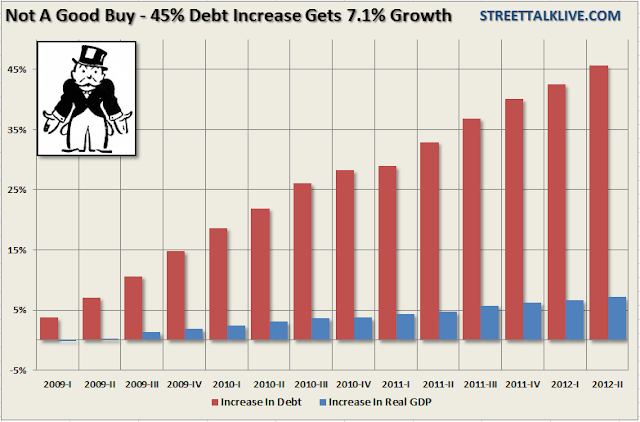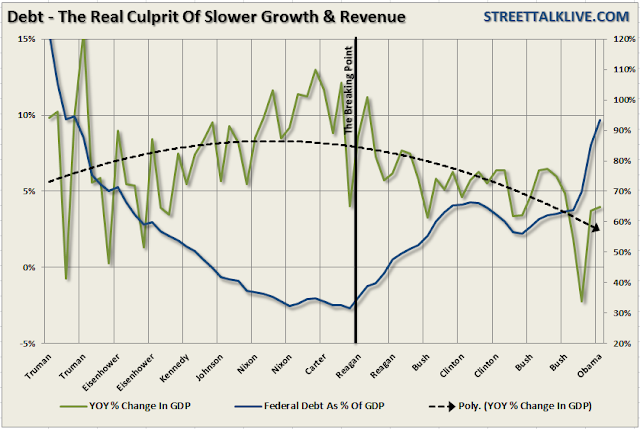BY LANCE ROBERTS
The people have spoken and President Obama will serve
another four years presiding over the United States. Furthermore, there is very
little change to the makeup of the House and the Senate, which leaves the
Administration in the same battle for control as it was prior to the election.
The question now is what will the next four years look like economically?
One thing that has been overlooked on many fronts is
that Obama had control of the House and the Senate when he first entered office
in 2009. This control lead to the passing of ObamaCare, successive bailout
programs for housing, automobiles, and the financial industry which flooded the
economy, and financial markets, with dollars - a lot of dollars. Those
injections, combined with a massively bombed out economy from the financial
crisis, led to a sharp rebound in economic growth which was almost entirely
centered around inventory restocking and a resumption of exported goods and
services.
However, in 2010, Obama lost control of the House to
the Republicans which has led to two subsequent years of political gridlock.
That gridlock has resulted in very little progress in providing the fiscal
policies necessary to support economic growth.
This lack of progress, which has clouded the planning
ability for small businesses, combined with the recession in Europe and
slowdown in China, has reduced the need for continued buildup of inventories as
the exportation of goods and services has been slowing. The chart below shows
the boom in both exports and imports post the recessionary bottom as stimulus
impacted the economy and the subsequent fade as economic strength has waned.
Rolling Over The Fiscal Cliff
Unfortunately for Obama he is now facing a "Congress Divided"with John Boehner at the
helm swearing to be the first line of defense against further progress of Obama
politics and spending programs. This does not bode well for the economy as the
"Fiscal Cliff" looms large into the end of
year. While it is hoped by many that Congress will work together to provide a
short term fix by extending the cuts for another year or so - I would not
be too sure about that possibility.
First of all, Obama has made it clear that he will
raise taxes on "the rich" and if he
gives in to extending the Bush tax cuts again it will not bode well with his
constituents. Secondly, it is highly unlikely that the Republican controlled
house will just go through with an extension of the cuts for a year as they are
committed to reducing the deficit and government spending. Therefore, it is
likely that they will be asking for cuts in exchange for changes to the tax
code. This impasse, and inability to cooperate, will lead to another "debt ceiling debate" as we saw in 2011
which will ultimately lead to the economy rolling over "the cliff." This is no trivial matter
as the economic impact of the increased taxes is roughly 3.5% of GDP in 2013.
With the economy barely pushing 1.5% currently a 3.5% clip from that growth
puts the economy into a very nasty recession. Of course, at that point, the
Administration will start asking for further bailouts and spending programs to
once again revive the economy.
What's Another $10 Trillion In Debt
Obama has already laid the foundation for his next
four years of Presidency - more green jobs, tackle global warming, raise taxes
on the rich and create jobs for the poor. That will come at a hefty price of
further government spending. In the first four years of his term Obama
increased the Federal Debt by more than 45%, however, with more than $5
Trillion spent in promoting everything from solar panels to housing, the
economy only grew by 7.1% during the same time frame (or a total of $905
Billion.) In other words it took more than $5.60 of debt to create $1 of
economic growth.
The amount of debt required today to create a single
dollars' worth of GDP today is clearly unsustainable. However, the current
Administration has been increasing Federal debt at a run rate of more than $1.2
Trillion annually to date. The understanding of the impact of increasing debt
on economic growth is crucially important to understand.
"the economic impact of spiraling debt levels that have eroded economic growth. Debt is, by its very nature, a cancer on economic growth. As debt levels rise it consumes more capital by diverting it from productive investments into debt service. As debt levels spread through the system it consumes greater amounts of capital until it eventually kills the host. The chart below shows the rise of federal debt and its impact on economic growth."The current Administration, however, is trapped into the belief that"big government" is the solution to the long term economic ills. However, a simple look at the impact of debt increases on economic growth tells us that this approach is misguided. Regardless, as stated above, further spending increases are going to rapidly run into an antagonistic House of Representatives who will push to block any additional spending programs.
While political gridlock has been a positive for the
economy during past Administrations - this cycle is different. Rising debt
levels, weak employment, declining wage growth and rising inflationary
pressures all act as a retardant to economic growth. Economic growth at sub-2%
levels is not strong enough to promote the kind of employment growth needed to
absorb increases in the natural working age population which continues to shove
an ever larger portion of the population into the masses that have "given up looking for work." In turn
this increases the dependency on government support leading to further weakness
in consumption and reduced demand which keeps employment weak.
While Bernanke has been flooding the system with
monetary policy focused at suppressing interest rates it is fiscal policy from
Congress that ultimately begins to clear the way for job creation. However,
with the burden of ObamaCare just on the horizon, the threat of rising taxes
and increased regulations covering everything from the financial industry to
oil and gas - businesses are remaining defensive to protect weakening
profitability.
While Obama will continue to increase the Federal Debt
to well beyond 100% of GDP - the reality is that economic growth will continue
to stall and muddle along at best. At the worst we are potentially facing
another recession in the very near future. Either way the economy ahead will
remain difficult and disappointing by almost any measure.
The Next Four Years
The next four years in the economy will most likely
look a whole lot like the last two. Sluggish growth, lots of political
infighting, and continued weak employment as business remain on the defensive.
For investors it will be a continued period of
volatility, lower market returns, a falling dollar and continued artificial
interventions by the Federal Reserve to suppress interest rates. The Fed's
ability to push asset prices has most likely come to an end as prices have been
stretched well above underlying valuation metrics particularly as the weakening
global economy weighs on revenues and profitability.
Furthermore, the issue of the "fiscal cliff" by the end of the year
puts the markets at risk of a sharp correction as positions are sold to lock in
capital gains at lower tax rates. Dividend yielding stocks, due to the income
chase, are trading at extremely high valuations and are set up for a sharp
correction as well.
Lastly, the onset of a recession in 2013, will impact
stock prices by at least 30% if not more. That correction will come swiftly and
as discussed in "Recession
Probability: 100%" it is
"...understanding when a recession has begun is hugely important to investors. The table below, which uses monthly S&P 500 data, shows the price declines during recessionary periods going back to 1873. The average drawdown to investor's portfolios is a little more than 30%. During recent recessions the damage has been far worse. "
Overall, the set up going forward looks like it has in
the past couple of years. It is unlikely that Obama will move to the center and
be more of a politician with the best interest of the economy at heart. It is
also just as unlikely that the Republicans will back down and begin to
cooperate with the Senate. I could be wrong, of course, and if I am then I will
chance my investment posture accordingly. However, the weight of evidence is
stacked in favor of "more of the same" which
means less for you and me.




No comments:
Post a Comment